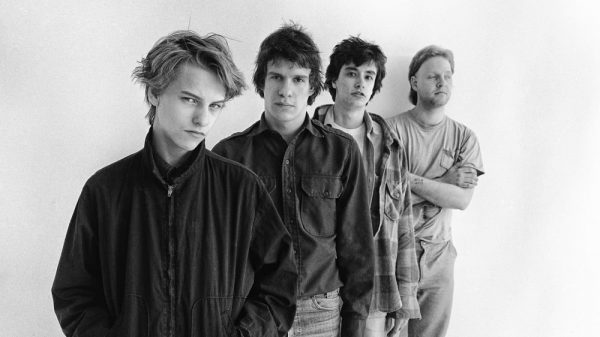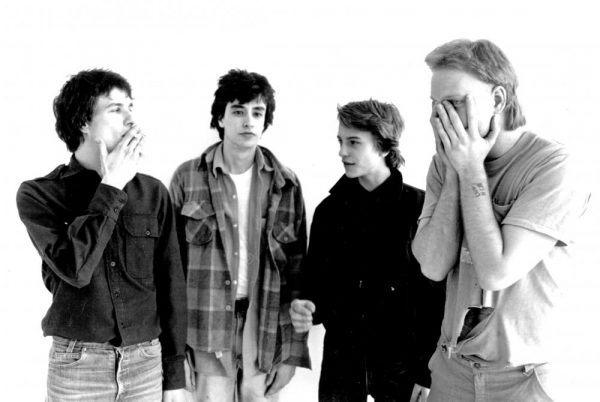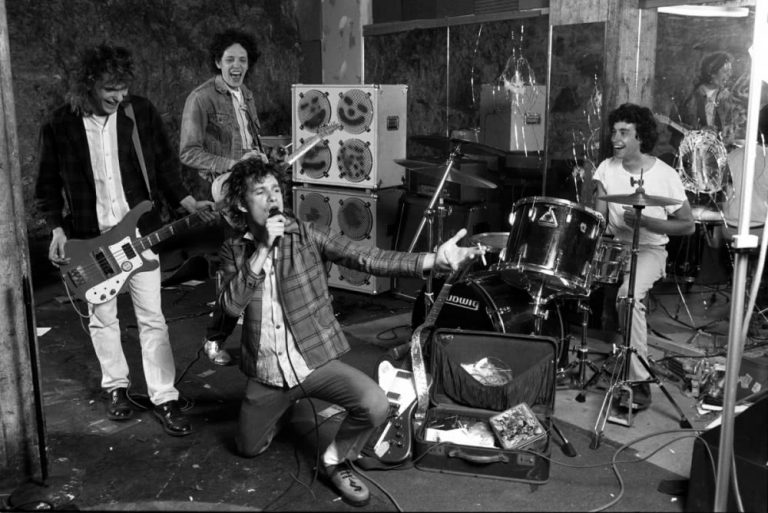“There have been better bands, louder bands, and drunker bands, but there has never been a better, drunker, louder band than the Replacements, and the second two qualifiers wouldn’t matter one whit without the first.” – Ari Surdoval, Torn and Frayed: The Story of the Replacements’ 1987 Classic Pleased to Meet Me
Memphis in the late ’80s was a shithole. You look at photos now and it’s like one big cement smear; all busted out neon lights, and stained, wind-blasted billboards. Once a hub of culture, music and sports, the city had been rocked by a series of large scale business closures, most notably the implosion of Stax Records in the mid ‘70s. The famous funk and soul label had barely been able to survive the death of its biggest star, Otis Redding, killed in a plane crash, and had been driven to insolvency by the excessive spending of its new owner Al Bell, leaving a gaping hole in Memphis’ cultural life.
After all, it’s not easy for a music scene to survive a big time bust like that, and Memphis’ commercial industry largely didn’t: recording studios were few and far between. That’s not to say there weren’t good bands about – Memphis musicians like Eddie Hinton and Tommy Tate were just starting to cut their teeth in the ’80s, and the scene was on the up. But such stars were hard to find, and mostly played low-end spaces like Huey’s, a burger bar.
It was through Memphis’ crowded, soot-stained streets that Paul Westerberg cut through one evening in 1987.
It wasn’t the safest place to make your way around after dark; the food was cheap and grease-laden; and the closest thing you could get to a cultural experience was to buy a jug of Gallo wine – a California brand more akin to literal piss and vinegar than the Semillon you could get up the coast – and get so drunk you passed out in a gutter. Which people did, often after they’d been kicked out of clubs with names like Bad Bob’s and Buck and Tiny.
It was through Memphis’ crowded, soot-stained streets that Paul Westerberg cut one evening in 1987. The 28-year-old was one of the finest singer-songwriters in the country, but you’d never know it from looking at him: straggle-haired and frequently clad in his trademark flannel shirts, he looked like the kind of guy who spends his day getting told to move on by the cops and drinking too much; probably because he was. David Fricke of Rolling Stone had once described him as “a former janitor with a lightbulb nose and tubercular singing voice”. That was maybe generous – Westerberg was the dark shape you crossed the road to avoid.

He was also a heavy drinker. He had spent some ten years honing his skills when it came to boozing, and by the mid-‘80s he’d start on a bottle of wine at noon and wouldn’t stop till he lost consciousness in the evening. The alcohol only exacerbated the pleurisy he spent months battling; you’d hear his cough long before he walked into a room.
Which is all a way of saying Paul Westerberg was one of those guys who was lucky to have music. The son of a Cadillac salesman, Westerberg was a whip smart teenager, but an abrasive one, and he spent his whole life railing against authority. Punk wasn’t just the kind of music he played; it was his guiding ethos, and he was famous for clawing his way to whatever he wanted.
For example, his band, The Replacements – he’d practically bullied his way into becoming their frontman. Walking home one day after work, he had heard a group of musicians playing Yes covers in their basement, and had been convinced that they were musical geniuses. “What got to me was the sheer volume and the wild thunder,” he later told Bob Mehr, the author of Trouble Boys: The True Story Of The Replacements. “That was the major attraction: the balls of a band to play that goddamn loud.”
The “band” was drummer Chris Mars, guitarist Bob Stinson and his younger brother Tommy, the bassist. They had a frontman, but Westerberg got them to fire him, and quickly took the reins of the act then called Dogbreath, eventually transforming them into a scrappy young punk and rock’n’roll act affectionately known as The ‘Mats.
The new lineup of The Replacements were that most dangerous thing: a band with something to prove.
But by ’87, as Westerberg made his way through Memphis to Ardent studios, the band wasn’t exactly scrappy anymore – they’d signed to a major label, Sire, and had released Tim, regarded by many critics as their magnum opus. Nor were they the same band that they had been all those years before, practising in the Stinson’s basement; they’d kicked out Bob. He was “the most wasted guy in a very wasted group”, as writer Ari Surdoval puts it, and they’d grown tired of his habit of getting so shitfaced he couldn’t even stand straight, let alone play.
Which means that summer in Memphis, the new lineup of The Replacements were that most dangerous thing: a band with something to prove. They had to prove to the departed Bob that they could get on fine without him; to the critical establishment at large that they could follow up a record like Tim; and to the public at large that the machine known as The ‘Mats wasn’t set to self-combust. Not yet, anyway.
To achieve all that, the band knew they had to get away from the limelight – to retreat from expectations, and work out who the fuck The Replacements even were now Bobby was gone. Hence Memphis, the shithole of all shitholes, and hence the record that they would spend that summer piecing together, a loud, ecstatic masterpiece called Pleased To Meet Me that might just be the one of the finest American albums of the last half century.
–
For a long time after The ‘Mats used it to record Pleased To Meet Me, there was a little stain on the roof of one of Ardent’s recording booths; the group’s parting gift to the space. Circular and dark, it went unnoticed by most, but not Ardent’s owner, John Fry. After all, Fry knew what it was. Fry knew that it was puke.
Buzzing on a Chinese liquid speed called Rock Fuel, Westerberg’d be fucked up on beer by the afternoon
“I’m not complaining, Jim,” Fry had said to Ardent’s production engineer, Jim Dickinson. “But I’m just curious: how did they get the vomit on the ceiling?” It was Westerberg’s puke, of course; he’d taken too vigorous a swig while downing a jug of Gallo wine, had vomited a little back into his hands, and then had hurled the chuck into the air.
https://www.youtube.com/watch?v=AUFWnbz2siM
It wasn’t even the wildest thing that Westerberg did during those recording sessions. He’d get into trouble at local bars, then return to Arendt to record for ten day spurts before he hit creative walls and had to recoup for a little bit. Buzzing on a Chinese liquid speed called Rock Fuel, he’d be fucked up on beer by the afternoon, and would stomp around Arendt’s basement, the so-called Dungeon. There he’d perfect the material – hone down strange, lopsided songs like ‘I.O.U.’ and ‘Alex Chilton’, his paean to the Big Star singer of the same name.
If Westerberg was nervous about the expectations on him and his band, he didn’t act like it. As was his wont, he’d make up lyrics on the spot, occasionally reading off scraps of paper and napkins he’d pull out of his pockets while up at the mic. Even the record’s swing and jazz elements were last minute additions: the saxophone part on the fizzy, bass-inflected ‘Nightclub Jitters’ was provided by Edward Kirby, a local star who Dickinson had recruited very late in the game.
And about Dickinson, actually. Westerberg had been predictably abrasive when first meeting the producer. Dickinson had rocked up while they were eating breakfast, and the band had been, again, predictably, pretty drunk. “I was dressed the way I usually dress, and Tommy said, ‘Look Paul, he’s got a flannel shirt. He’s just like us,’ Dickinson would later tell Surdoval. “And Paul said, ‘I don’t care what his shirt is. He’s not like us.’”

But over the course of recording, Westerberg had warmed up to the young one-time session musician and man about town. Westerberg’d often be like that, actually. The only person he’d ever really liked from the very get go was Tommy Stinson, who Mehr notes was the closest thing Paul ever had to a love of his life, but he did end up trusting Dickinson all the same.
The band didn’t talk much about the record they were assembling, or even their future, though it was clear they all wished Bob was there. “I could feel everyone else missing Bob,” engineer John Hampton told Surdoval. “A kind of insecurity, a kind of ‘What do we do?’ An aura in the room is the best way to say it. They were all going nuts, but they were trying to be serious, trying to grow up at the same time.“ Dickinson even suggested they call the record Where’s Bob? No-one thought the joke was very funny.
Even with Bob Stinson gone, Paul Westerberg sometimes struggled a little with sounding like himself.
But the absence of Stinson wasn’t just a creative dearth, or a source of the band’s collective anxiety. It helped free Westerberg up a little too. See, he had always been afraid of his softer side; always felt ashamed of how much he loved the quiet balladry of Alex Chilton and Big Star, and how comfortable he felt with an acoustic guitar in his hands.
Whether accurately or not, Westerberg felt Bob was the one who would most object when he’d bring stripped down acoustic songs about alcoholism, and love, and death to the band. So sometimes, in the past, he’d written songs and not played them for the group; had kept them all for himself. Now, with Bob gone, Westerberg didn’t have to feel so ashamed.
Well. He didn’t have to, but he did. ‘Skyway’, the gentlest song on Pleased To Meet Me, was recorded by Westerberg and Westerberg alone. He stole into Ardent early one morning before anyone else had arrived and played the tune by his lonesome, sitting close to the mic and with his eyes closed. Even with Bob Stinson gone, Paul Westerberg sometimes struggled a little with sounding like himself.
—
In terms of their immediate goals, Pleased To Meet Me couldn’t have been any more of a success for The ‘Mats. It was heralded immediately as a triumph, praised by writers as diverse as Robert Cristagu and David Fricke, and later hit third place in the Village Voice’s influential Pazz and Jop critics poll.
The Replacements had proved to the world that they could skirt with the very limits of respectability and cohesion without ever falling apart.
And even though the band were a mess – still alcohol sodden and dysfunctional – they managed to take the record out on the road for perhaps the best tour of their career. They played like the legends they had slowly become, and even their onstage flubs and fights became tangled up in the mythology of the perennially fucked up game-changers.
They had done everything that they wanted to do. They had proved to the world that they could skirt the very limits of respectability and cohesion without ever falling apart, and that, Bob Stinson be dammed, the loss of one member wouldn’t have to result in the end of the band.
https://www.youtube.com/watch?v=q23lMz4iiWY
Of course, experience that kind of success and the only way for you to go is downhill. Within four short years the band would finally combust. Bob Stinson would die four years after that, succumbing to the alcoholism that had ravaged his life and got him kicked out of the band that had made him famous. And the legendarily iron-livered Westerberg would be forced into sobriety, unable to keep up with the side effects of his boozing.
But none of that changes what they did. Right when they seemed most ready to fail – to disintegrate into their composite parts – they produced one of the greatest examples of American punk rock ingenuity ever laid to tape. And sure, maybe that’s not a fucking fairy tale. But with The ‘Mats, you don’t get fairy tales. You get stories that end like this: with life, just briefly, going okay.


































